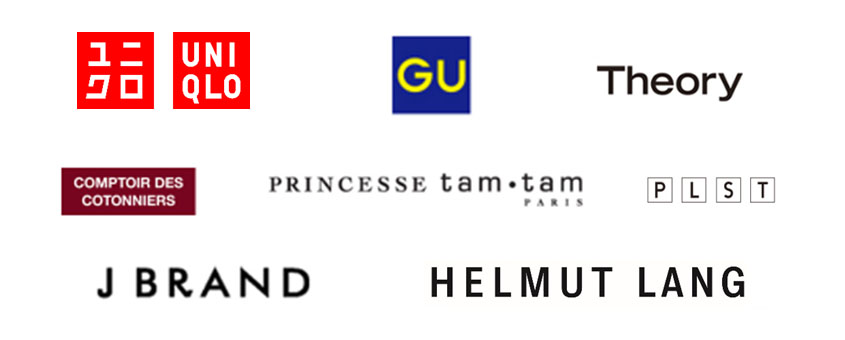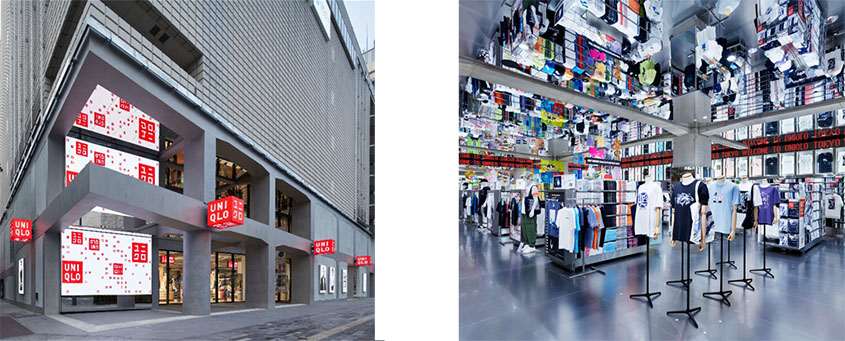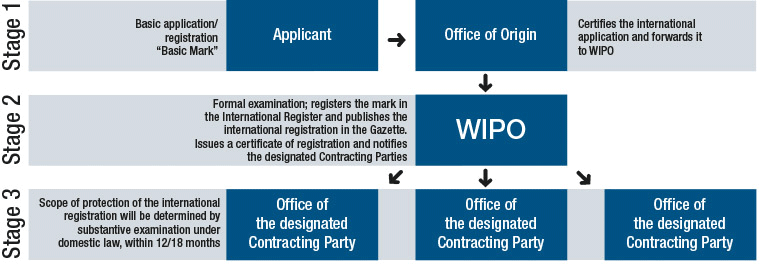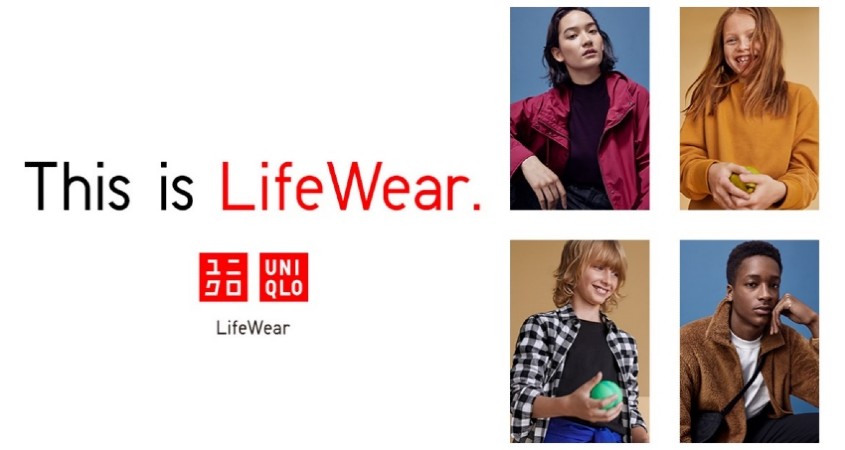From department store chains such as Macy’s to high-end luxury boutiques like Chanel, the apparel market is a major industry with a large selection of goods from a vast array of retailers each vying for customer loyalty. While a clear vision, a strong sense of entrepreneurship and hard work are all necessary to generate growth, Fast Retailing Co., Ltd. also understands the importance of one other factor: a strong brand identity coupled with the protection provided by an effective intellectual property (IP) system.

Images: FAST RETAILING CO., LTD
Thirty-six years after entering the casual wear market, Fast Retailing Co., Ltd. (the Fast Retailing Group) has become one of the world’s largest apparel retail companies, with sales of approximately 2.2905 trillion yen for the 2019 fiscal year ending August 31, 2019 (U.S. $21.53 billion, calculated in yen using the end of August 2019 rate of $1 = 106.4 yen). UNIQLO is the largest of eight brands in the Group, which also includes GU, Theory, Helmut Lang, PLST (Plus T), Comptoir des Cotonniers, Princesse tam.tam and J Brand.

Images: FAST RETAILING CO., LTD
Tailoring consumer perception
To stay competitive, even companies with powerful brands require constant diligence and quality controls to maintain their edge in the market. While branding contributes to consumer perception of a line of goods and the company associated with those goods, a company’s ability to protect its investment lies in their use of the IP system.
Branding is an important factor in almost all markets, but some fields are more sensitive to consumer perception of a brand. For example, for products such as office supplies, consumers tend to focus on the characteristics and costs of the products. On the other hand, when in the market for a new article of clothing, consumers tend to rely on the value they associate with the brand.
The Fast Retailing Group offers customers a well-rounded experience whereby consumers can compare different options before making a purchase. Aside from price, consumers tend to check the quality, design and style when shopping for apparel. Thus, for the Group it is important to have a unique and memorable brand with a perceived value or reputation.
Trust in a brand is especially vital in today’s online marketplace, where a purchase can be made with one click. Fast Retailing not only designs, manufactures, distributes, and sells a wide array of apparel goods, they also focus heavily on their branding for not only establishing consumer awareness, but also loyalty. To improve consumer perception of its brands, the Group invests heavily in marketing and in the protection of their brands.
Take for instance UNIQLO, the largest of their brands, operating in 25 markets today including Japan: the brand logo adopted by the company is highly distinctive and was specifically designed to provoke a reaction from consumers. The choice of red and white (a nod to the Japanese flag) and the use of katakana (a specific set of characters in Japanese used for foreign words), alongside the Roman alphabet equivalent helped UNIQLO establish itself as a “cool Japanese brand” at home and abroad. As such, UNIQLO is not only Japan’s leading specialty retailer, it also ranks as one of the top apparel brands worldwide.

Images: FAST RETAILING CO., LTD
How does the WIPO Madrid System help Fast Retailing protect their brands worldwide?
The Fast Retailing Group understands the importance of providing each of their brands with the appropriate level of protection. They believe that registering their brands as trademarks under the IP system is the best way to effectively protect their investment in branding, goods and even specific services.
The Group actively strives to secure trademark protection in countries where new stores are opened or where manufacturing partnerships are established. Furthermore, as one of the top three apparel retailers in the world, Fast Retailing strives to also acquire trademark protection in potential key markets, even if the Group has yet to enter the markets.
In such cases where there is a high demand for trademark registrations in multiple jurisdictions, the WIPO Madrid System offers a cost-effective option to apply for trademark protection by filing a single international trademark application.
Under the international trademark system, users can file a single application with a national or regional IP office of a Madrid member. The submitted application is certified by the same IP Office, or “Office of origin”, and then forwarded to WIPO. WIPO conducts a formal examination and notifies directly the IP offices of the designated countries, who will decide according to their legislation. With the Madrid System, the process of multinational trademark registration is streamlined through a single application and management process, providing a quick and often more economic route to registration.

For Fast Retailing, the WIPO Madrid System is a simple, straightforward, and overall, more cost-effective approach to international trademark registration, as opposed to individual filing procedures on a country-by-country basis. This allows the company to more easily access key markets as well as potential ones.
More than cost benefits, the simplified procedures adopted by the WIPO Madrid System for international trademark registrations are also a big advantage for the Fast Retailing Group. For example, with the WIPO Madrid System there is no need for the company to hire a local attorney in each jurisdiction nor to be represented by a power of attorney for every application. The WIPO Madrid System also allows the Group to better mitigate risk, as the structure of the system provides users with the opportunity to adopt registration strategies that reduce on the likelihood of a so-called “central attack.”
The principle of central attack refers to a situation in which the national IP office of origin cancels or invalidates the initial trademark registration, or ultimately refuses the initial application, within five years from the international registration date. This dependency between an international registration and the initial registration means that any loss in protection of an initial registration also results in the loss of protection of an international registration in the designated contracting parties, i.e. “central attack.”
In this regard, the Fast Retailing Group can reduce the risk of a central attack by two means:
- Prior, substantive examinations carried out by the company’s Office of origin (in this case, the Japan Patent Office) at an early stage; or
- Submission of an international application after the registration of the initial trademark.
In addition, a subsequent designation can be requested once the five-year dependency period ends, avoiding the risk of a central attack.
Fast Retailing Group and the WIPO Madrid System in practice
UNIQLO (International Registration Number: 1156890)
For UNIQLO, the concept of LifeWear is central to the identity of the brand. The company defines LifeWear as “clothing designed to improve everyone’s daily life. It is simple, high-quality, everyday clothing with a practical sense of beauty, ingenious in detail, designed with life’s needs in mind, and always evolving.”
As UNIQLO continues to expand its product and fashion lines it is therefore important to also increase consumer awareness of the brand. The WIPO Madrid System allows UNIQLO to file a single application for registration, and acquisition of a wide range of rights, in every key and potential market.

Brands consumers can trust
From a single clothing store in southwestern Japan to a leading global apparel retailer, the Fast Retailing Group recognizes the importance of branding and the value in building a strong brand identity with consumers. As the Group further grows and evolves in new and existing markets, a solid branding strategy and well-structured system for international trademark protection are a must. The convenient and cost-effective procedures under the WIPO Madrid System provide the structure necessary for companies looking to achieve such goals.
Source: WIPO

 Client Focus
Client Focus